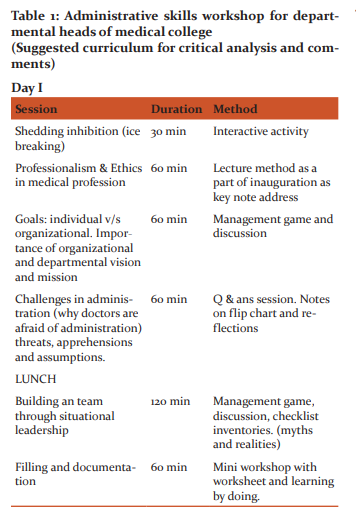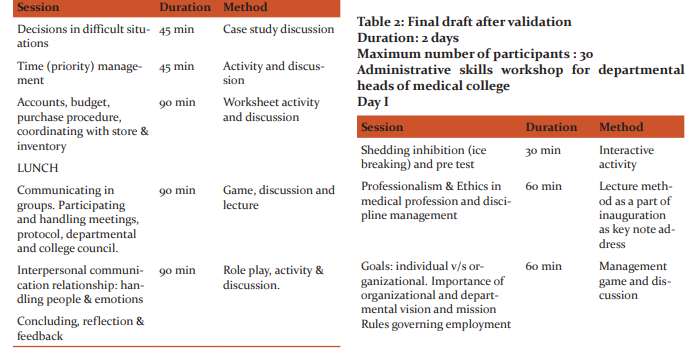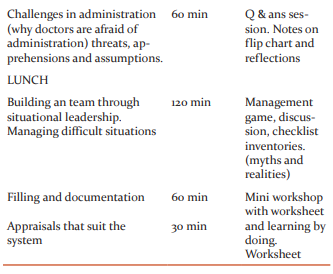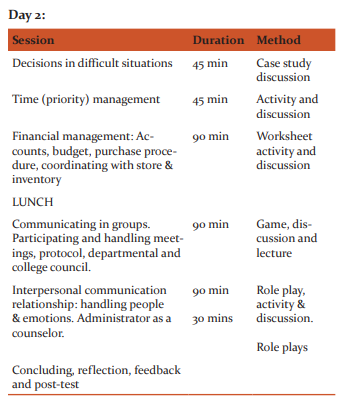IJCRR - 8(17), September, 2016
Pages: 04-09
Date of Publication: 11-Sep-2016
Print Article
Download XML Download PDF
DEVELOPING AND VALIDATING CURRICULUM FOR ADMINISTRATIVE SKILLS WORKSHOP FOR DEPARTMENTAL HEADS OF MEDICAL COLLEGE
Author: Suresh N. Chari, Madhur M. Gupta, Shubhada A. Gade
Category: Healthcare
Abstract:Context: Heads of department in a medical college are required to be fully trained to assume administrative roles. Unfortunately the medical education curriculum is silent on these issues and it is left to the teacher to learn these skills either by shadowing or by self-experience while on the job. Literature is also scarce on a defined validated curriculum for holding such workshops.
Aims: To develop and validate a curriculum for administrative skills workshop for departmental heads of medical college.
Settings and Design: Initial first draft of the curriculum was prepared based on the experience and knowledge of the mentors and the author. This was circulated to 7 experts (three deans of medical college, 2 management experts, and two heads of corporate hospitals) for their comments and suggestions on the duration, content and method of delivery. Telephonic conversation, conference calls and email discussion with them was extensively done to come to a consensus. This final draft was sent back to the experts as a last phase of validation.
Results and Conclusion: The study in all probabilities demonstrates the first validated curriculum for conduct of a two day workshop on administrative skills for thirty head of departments in a medical college. This is the need of the hour since a head of department in a medical college in India has to struggle to meet the administrative needs of the organization
Keywords: Administrative skills, Head of department, Medical college
Full Text:
INTRODUCTION
Administrative skills are of paramount importance for heads of department or heads of institute or for that matter for people in managerial position. Medical profession is no exception (1). All heads of department in a medical institute are medical postgraduates who have become head of departments due to either hierarchical compulsions or other reasons and have never been exposed to administrative skills. Each medical college in India have about 20-25 academic departments along with non-academic departments which are support ancillary units. Each department head has to manage three functional areas i.e academic teaching, clinical patient care and staff management. All the three are equally important and are directed towards fulfilling the objectives set for any medical college. For whatever reason, there is a large scale observable incompetency in leadership skills of people in managerial positions in medical institutes (2). Although leadership and administrative skills appears to be subtly different, they are inseparable and there is an urgent need to train people on basics of these skills. Medical council of India has in its vision document 2015 stated certain set of skills that are required for a medical graduate to enable him to become an Indian medical graduate. However the contents of this document has not yet been put to place in the right perspective. It has been also empha sized that thrust needs to be given on basic skills in human resource management, leadership qualities which is presently missing in the curriculum. (3) Robert Kartz (4 ) has explicitly documented certain set of skills that the administrative head of the department must possess for effective administration, a three scale approach which encompasses technical skill, human skill and conceptual skill. Multi-factorial complexities exist in the administrative demands of departmental heads of medical college like completing the medical curriculum, handling multiple stake holders, patient care, specific departmental facilities for health care, students activities both undergraduate and post graduate, departmental and college council meetings, filings and documentation, membership in various institutional administrative committees and many more. Administrative and leadership skill workshops are a regular feature in management colleges and administrative staff colleges where the need of the target population has been identified and a need based curriculum is in place. One workshop on administrative skills for doctors and one for hospital staff was conducted by the author preparing a need based curriculum which was highly appreciated by the participants, though the work was not published. Although, Voll et al showed that ward round administrative skills can be taught effectively to final year medical students (1) and Aluise described an administration development curriculum for academic physicians (5), there is no literature available on formal administrative skill workshop or course or curriculum for the workshop on administrative skills for faculties of the departments of medical colleges and more specifically for head of departments in a medical college. It was with this view in mind that a curriculum for administrative skill workshop was developed for department heads of medical colleges and validated taking opinion of experts in varied yet related fields.
SUBJECTS AND METHODS
The study which has a qualitative study design was carried out at a medical college in central India. After obtaining ethics clearance the process went through the following steps: Step I – The first draft curriculum for administrative skills for head of departments of medical college was prepared based on critical study of present scenario and need, the authors experience as a facilitator and trainer in leadership, communication, relationships and administrative skills workshops and discussion with two mentors from the field of medical education and administration. The first draft curriculum took into consideration: the target population, time frame, feasibility, previous curriculum, need areas and future implementation. Step II – Experts in the field of management and health care were identified for validation process of the curriculum. They were one dean from established private medical college (herein call as Dean 1), one dean from medical college attached to deemed university (Dean 2), one ex-dean from a premier government medical college (Ex Dean), two management experts both from highly reputed nationally ranked management colleges (management expert 1 and management expert 2) and two heads of leading corporate hospitals (CH head 1 and CH head 2). Consent was obtained from all the experts first telephonically and subsequently through email. The first draft curriculum was mailed requesting them to react on the content and design within one month. The email specifically requested their comments on the duration of both program and session (suggested two days), contents (including sequence) and method of delivery.
Step III - The experts sent their responses back within 20 days and the comments were discussed and analyzed with the mentors. Step IV - Individual telephonic conversation, conference calls and email discussion with the experts and mentors for understanding their suggestions and comments and for coming to consensus regarding retaining, deleting and/or addition of session(s). Step V- A final draft was developed along with the mentors, taking into consideration the suggestions and comments of the experts. Step VI – As a last step in the process of validation, the final draft was resent to experts for approval which was received back within 15 days. Step VII - Final curriculum was prepared.
RESULTS
The first draft curriculum after focused group discussion with the mentors that was sent to the experts is shown in table 1

Day2:

The changes suggested by the experts were as follows:
1. Dean 1 – suggested that the duration should be of 3 days and recommended immediate and long term assessment of the usefulness of the program.
2. Dean 2 – Opined that the content, duration and the methodology was appropriate but suggested inclusion of pre and post-test.
3. Ex Dean - suggested that the objectives and the contents should be strictly towards administrative skills and the area of the management be dealt with separately.
4. Management expert 1 – Suggested that the methodology should be adult learning centric and highly interactive. He further suggested that the workshop should be held outside the campus and that appraisal systems should be one of the inputs. He further mentioned that although there are too many sessions for the two days they should not be done away with since they will be useful in sensitizing the participants.
5. Management expert 2 – Suggested inclusion of discipline management in the session of professionalism and the size of the group should not exceed thirty.
6. CH Head 1 – Emphasized on the inclusion of rules and regulation of employment. He further suggested that one day should be included for risk and disaster management.
7. CH Head 2 – Suggested that a proper evaluation and long and short term feedback of the program and the workshop must be included though it may not be a part of this curriculum. Inclusion of financial management in this two day workshop was desirous.
The final draft after the comments of the experts were discussed with the mentors and is shown in table 2


DISCUSSION
We often see a large number of heads of department in every medical college of India struggle to meet the needs and demands of the organization. A head of department in a medical college are required to assume many leadership roles like resource management, program implementation, decision making, relationship management and financial regularities. They should also have this capacity to develop second line of leadership. Since an organization grows only when the head is the role model for others. Medical schools equip the students with a vast knowledge of clinical medicine which is no doubt important but equally important are many administrative skills which are only assumed to be learnt during a shadowing period or deferred until doing the job for real. A qualified medical doctor could be an expert physician but with deficit administrative skills he could fail to take the organization to the next level. Skills can be developed and one of the methods is structured training programs. In this era of modern medical education, time has come to impart administrative skills to all medical professionals more so to the top level management i.e head of departments. In spite of extensive review, literature indicating conduct of formal administrative skills workshop for head of departments of medical colleges was inadequate. This validated curriculum on administrative skills workshop for head of departments of medical colleges is the need of the hour since they are responsible for multitude of tasks like communicating with people, understanding financial management, horning people skill, setting the right target with a clear vision, handling of emotions yet with professionalism and ethics. In the present study, all the experts who were a part of this project during one on one discussion felt this need of developing a validated curriculum for administrative skills workshop. In fact they also recommended that this curriculum can be used by any medical institute in India since the challenges faced by head of departments are almost similar in any medical college in the country. The first author and the mentors have a vast experience of administration in a medical college in various capacities. The first author has been regularly conducting sessions on leadership, team building, communication-relationship skills, goal setting, time management, group communication for corporate and institutional setups. He has also been conducting such training programs in management colleges, engineering colleges and institute of chartered accountants since last twenty years. All these sessions in the above programs were designed as per the need of the organization taking several factors into consideration. Of the two mentors one has been head of institute, university and academic governing council, the other mentor has been in public and private sector medical college as head of department and administrative head of many committees for more than forty years and both are well aware of the importance of professionalism, ethics and administrative demands of a head of department in a medical college. Based on their experience and expertise in training, administrative and leadership skills the first draft of the administrative skills workshops for head of departments of medical college was designed. The authors and the mentors took into consideration all the facets and challenges faced by head of the department in a medical college while preparing the first draft. The experts found the first draft very appealing but added a few inputs. During discussion with mentors it was felt that most of the suggestions and comments given by the experts were relevant and have were incorporated in the second draft in one form or the other taking the duration into consideration. Except one all experts felt that the duration of the program should not exceed two continuous days since the head of departments can probably spare only these many days for training. All the experts agreed that the program should be for not more than 30 participants and that it should be highly interactive with more of activity than being only didactic. Inputs like rules governing employment, appraisal system and purchase procedure were added in the final draft as per recommendations by the experts and approval by the mentors. They further said that the titles of the administrative skill sets required may appear to be same in different organizational setups but the fashion and method of applying them will differ depending on size, nature, work culture, ethics and level of demand of professionalism of the organization. Like any head of the department in any organization, the head of department of a medical college has to deal with his teaching staff, peer group, the non-teaching staff who could be a clerk, technician, asst. technician or attendant. The other stake holders in his area of operation are parents, students, patients, relatives, nursing staff, administrator and the management. In short, the heads of department of a medical college have to be good leaders.(2) They have to give direction and support in blended proportions that suit a situation and this is a major essential for man management. Hence a sessions on situational leadership, team building, interpersonal communication relationship, group communication, decision in difficult situation and individual and organizational goals were included in the curriculum. Professionalism includes strict adherence to courtesy, honesty and responsibility while dealing with individuals. Ethics is concerned with personal values that can be demonstrated by the seniors which can be instilled in the other employees. Professionalism and work ethics can go hand in hand and helps in establishing a good reputation of the place of work and its work culture. In fact, a physician charter on professionalism (6) emphasizes on active dedication to the three principals of professionalism and enlists ten commitments to the welfare of the patients with an aim to improve global health care systems for the welfare of the society. Hence a session on professionalism and ethics is relevant before understanding the basics of administrative skills. Moreover, it is important that heads of department working in the institute must have almost similar views on professionalism and work ethics as the Dean and the management. One of the two very basic yet very important areas in administration is the art of articulate filing systems which help retrieve documents as and when the need arises. The second important input which doctors shy away from is accounts. As you grow in hierarchy in the departmental setup in medical institutes one is never exposed to terms like budgeting, comparative statements and purchase and final procurement of instruments, equipment’s etc. although this needs an independent session, the experts felt that one session should be devoted to these areas with the objective of at least sensitizing the head of departments on the financial management of the institute. After seeing the second draft, in general all experts felt that the contents, the design and the time duration (two days) were appropriate. It takes care of the immediate need of the heads of department of medical college, they said.
This is probably the first validated curriculum for the conduct of a two day workshop for heads of department of medical colleges in India. This curriculum evolved as a result of extensive deliberation with the mentors and experts about the content, duration, feasibility, utility and need of the participants in question. During these discussion issues like some sessions being cramped up and some being given “less time” cropped up. However, the general consensus was that the input of the two days should be sufficient to sensitize the head of departments of issues that have never been formally discussed by them early. It was also recommended that apart from pre and post-test participants should be assessed for the usefulness after a period of 6-8 months where a session could be held for reflection on issues / situations faced by the participants and strategies adopted by them to overcome the same. One other point of discussion with the mentors and experts was about the challenges during implementation. It was felt that since creativity and effectiveness of each session will differ from trainer to trainer and hence a simultaneous curriculum for training the trainers should be in place to develop a pool of trainers for this program. Similarly a trainers and participants guide / manual should be available with the trainer much before the start of the workshop. Hence, this work talks about a curriculum for an administrative skill workshop which is only a first step and would be complete only when it is implemented.
CONCLUSION
Administrative skills is necessary for a medical professional whether in a medical college or in a health care setup. A validated need based curriculum was the need of the hour and all such people should undergo a two day workshop using this curriculum. This would probably improve the working environment and ultimately help patient care.
ACKNOWLEDGEMENT
Authors acknowledge the immense help received from the scholars whose articles are cited and included in references of this manuscript. The authors are also grateful to authors / editors / publishers of all those articles, journals and books from where the literature for this article has been reviewed and discussed.
References:
1. Voll J, Bragg D and Maxwell-Armstrong C. A master class in administration skills for future foundation doctors. International Journal of Healthcare Education and Medical informatics 2015, 97 (3): 15-18.
2. Jindal SK. Editorial: Leadership in medicine. Indian J Chest Dis Allied Sci 2014.56: 69-70.
3. Sood R, Adkoli BV. Medical Education in India-Problems and Prospects. Indian Academic of Clinical Medicine.2000; 1(3):210-212.
4. Robert. L. Katz. Skills of an Effective Administrator. A Harvard Business Review Classic. 1974; 52(5): 90-102.
5. Aluise JJ, Scmitz CC, Dland CJ and McArtor RE. Administrative skills for academic physicians. Medical teacher 1989, 11(2): 205-212.
6. Medical professionalism in the new millennium: A physicians charter. Project of the ABIM foundation, ACP-ASIM foundation and EFIM. Ann Intern Med 2002; 136 (3): 243-246.
|






 This work is licensed under a Creative Commons Attribution-NonCommercial 4.0 International License
This work is licensed under a Creative Commons Attribution-NonCommercial 4.0 International License